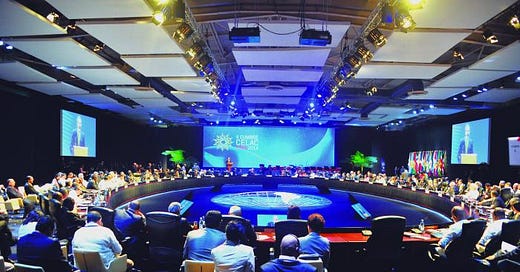Saint Vincent and the Grenadines is the second smallest nation in the Caribbean, with a population of 110,000. In spite of its small size, Saint Vincent and the Grenadines, under the leadership of Prime Minister Ralph Gonsalves, has played a dynamic role in continuing the revitalization of CELAC, the Community of Latin American and Caribbean States, the relatively new regional organization that unites thirty-three countries and that stands as a political counterpoint to the Organization of American States, the U.S.-led organization with a decidedly imperialist projection.
The idea to create an organization that united the thirty-three independent nations of Latin America and the Caribbean emerged during the summits of Latin America and the Caribbean on Integration and Development, held in Brazil in 2008 and in Mexico in 2010. The idea became reality at the Founding Summit of CELAC, held in Caracas, Venezuela on…



